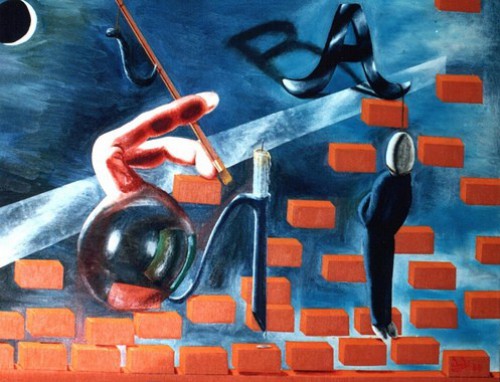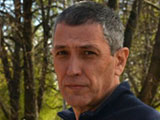Notes on Leaving
by Israel Centeno and translated by Kelly Harrison / November 7, 2013 / No comments
Exile, blame, adaptation: Victims and the periphery.

Aleph, by Wasfi Akab. Oil on canvas, 1988. Photo: Wasfi Akab via Flickr.
In conversations with some people I have felt, or they have made me feel, the following:
“You left; you didn’t stay to fire the last shot. You didn’t sacrifice yourself as we, those who stayed, did. I’m not leaving because I have hope for our country,” etc. Sometimes subtle and sometimes crude, the message seeps in. Unpleasant, sometimes unconscious, it makes itself known.

- From his lonely watch post Albert Camus asked who among us has not experienced exile yet still managed to preserve a spark of fire in their soul. “We’re all alone,” Natalia Sedova cried in exile on hearing of her husband Leon Trotsky’s affair with Frida Kahlo. In his novel Night Watch, Stephen Koch follows the incestuous love affair of David and Harriet, wealthy siblings watching the world from their solitary exile. Koch’s writing, Camus’s theories, and Trotsky’s affair all come back to exile and lead me to reflect on the human condition. From my own vantage point, my Night Watch, I will reflect on my questions of exile, writing, and the human condition.

- Israel Centeno was born in 1958 in Caracas, Venezuela, and currently lives in Pittsburgh as a Writer-in-Residence with City of Asylum/Pittsburgh. He writes both novels and short stories, and also works as an editor and professor of literature. He has published nine books in Venezuela and three in Spain.
Recently a nineteenth-century idea of patria, or fatherland, has been extolled. Patria: The most superficial and frivolous notion of belonging to “one land, one sky, one whole, etc.” It is never mentioned, perhaps deliberately, that our country was formed of people who left their own lands when reality became unbearable: Italian, Polish, German, Spanish—people of all latitudes. Migration is a right, a mandate, an archetype recognized even in “the classics” and “the sacred texts.” Those who leave don’t necessarily shirk the tragedy of the country they’ve left behind; sometimes they become even more involved, with a distinct, necessary, and important new perspective. Conversely, not all of those who stay work intrepidly to change the state of things, aside from outbursts on social networks. Rather, people assimilate themselves into a status quo, leaving others to adapt to adversity.
I suspect that in the Warsaw ghetto they knew how to forge a “normal” routine. Man’s ability to adapt is immense, and is part of Hamlet’s dilemma on life and death.
That’s what happens in Venezuela: The unacceptable starts to become normal. For example, if in one attack nothing happens to you, and they actually let you live, then nothing really has happened to you. So you say, “OK, they’ve let you stay.” Furthermore, if the treatment you receive at the hospital is lacking, your medication out of date and of questionable quality, you say, “OK, but it’s free here. In other countries they’d just leave you to die.” You begin to legitimize the prisons imposed by violence and insecurity, to shut yourself inside after six in the evening, and even come to say, “Well, what do you fucking expect? Who sent him out at this time, showing off his iPod, when there are so many fucked-up people around?” This is when we have grown to accept the slogan of those in power: Having things is bad. If you have to do business via corruption, because that’s the norm, there’s no other way, and making money never hurt anyone, you might find consolation in a phrase like this: “It’s my asymmetrical war against the regime.” For God’s sake, in Venezuela you cannot make money without dancing to the tune of the president’s band.
But there are still courageous people. They stay, and they don’t get used to it. They search, they think, they get angry, they try to articulate a political response in a poisoned reality and they commit to doing what’s required of them. Even within the country there are movements, and when you face up to those in power you always do it from the periphery, whether you are in a neighborhood in Maracaibo, a housing estate in Valencia, a university in Caracas, or in any other part of the world.




